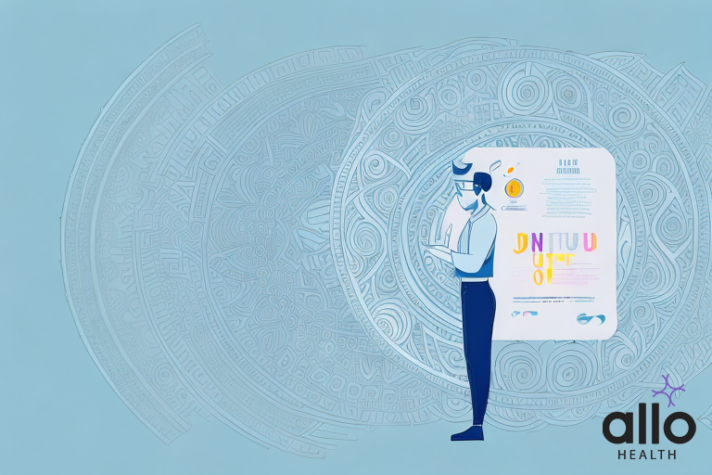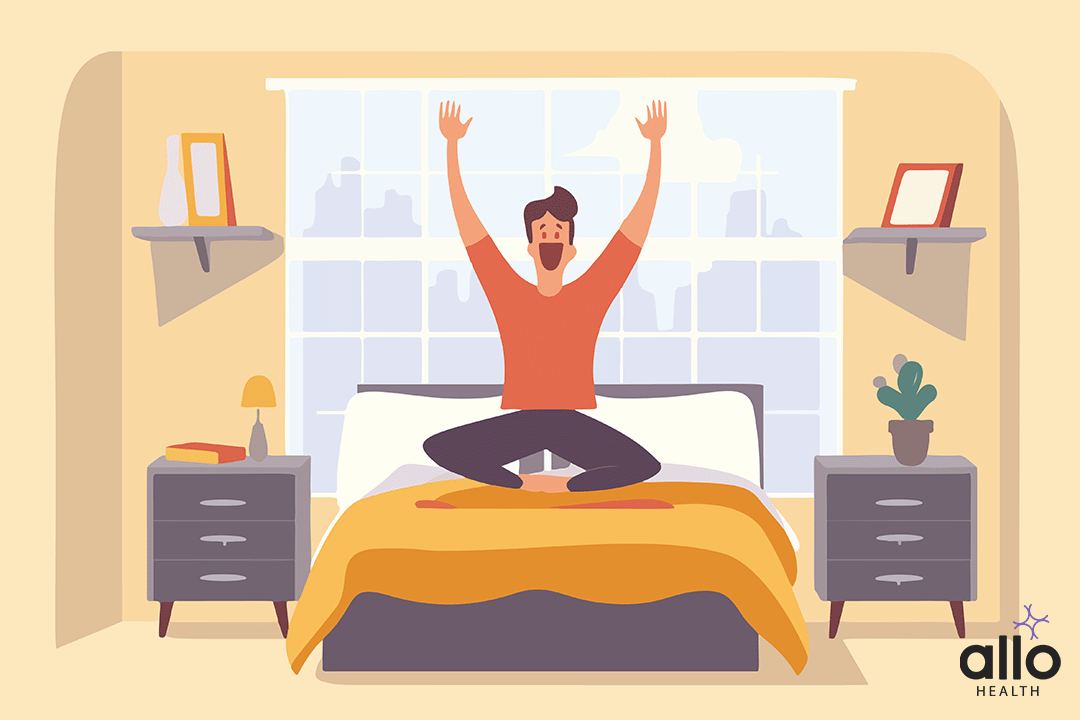Panchakarma For Premature Ejaculation

Allo Health is dedicated to personalized well-being, offering support and trusted information tailored to individual health goals. The platform emphasizes human-generated content, led by a distinguished medical team of experts, including physicians and sexual health specialists. Their commitment to credibility involves rigorous fact-checking, authoritative research, and continuous updates to ensure accurate, up-to-date information. Allo Health's unique approach goes beyond conventional platforms, providing expert-led insights and a continuous commitment to excellence, with user feedback playing a crucial role in shaping the platform's authoritative voice.

Dr. Raj. R holds an undergraduate medical degree from the Philippines, and has a bachelors background in Psychology. His experience working in the field of urology further brought his interest forward in working towards his passion of understanding the science of attraction, intimacy, sex and relationships. A key motto he practices by remains unprejudiced and non-judgemental care.
Why This Was Upated?
Our experts continually monitor the health and wellness space, and we update our articles when new information became available.
Updated on 11 January, 2024
- Article was updated as part of our commitment to diversity, equity, and inclusion.

"The following blog article discusses alternative medicine practices and their potential effects or benefits. However, it is important to note that the information provided is for general educational purposes only and should not be considered as medical advice or a substitute for professional guidance from a qualified healthcare professional. Before considering any alternative medicine practices or treatments, it is recommended to consult with a healthcare professional.
Book consultation
Alternative medicine encompasses a wide range of practices that may not have undergone rigorous scientific evaluation or received widespread acceptance within the medical community. The effectiveness, safety, and appropriateness of alternative medicine practices can vary significantly depending on the individual, their specific medical conditions, and other factors.
It is important to approach alternative medicine practices with caution and skepticism. Some practices may carry potential risks or interact with existing medical treatments. A healthcare professional can provide guidance based on your medical history, evaluate the available evidence, and offer informed advice regarding the potential benefits and risks of alternative medicine practices.
Individuals with specific medical conditions, allergies, or taking medications should exercise particular caution when considering alternative medicine practices. Some practices may have contraindications or adverse effects, and it is essential to discuss these potential concerns with a healthcare professional before pursuing any alternative treatments."
Panchakarma is a traditional Ayurvedic therapy that involves a series of detoxification and rejuvenation treatments. While Ayurveda, the ancient Indian system of medicine, has been used to address various health concerns, including sexual health, it’s important to note that its effectiveness in treating specific conditions like premature ejaculation may vary from person to person.
Premature ejaculation (PE) is a common sexual concern that can have physical and psychological causes. While there are Ayurvedic treatments that focus on sexual health, such as herbal remedies and lifestyle changes, the effectiveness of Panchakarma specifically for premature ejaculation has not been extensively studied in scientific research.
If you are experiencing premature ejaculation and are considering Ayurvedic treatments, it is advisable to consult a qualified Ayurvedic practitioner. They can assess your overall health, understand your specific condition, and provide personalized recommendations. Ayurvedic practitioners may suggest specific herbs, dietary changes, lifestyle modifications, and possibly Panchakarma treatments tailored to your individual needs.
It’s important to approach any form of treatment, whether conventional or alternative, with caution and under the guidance of qualified healthcare professionals. Additionally, open communication with your healthcare provider is crucial to addressing any sexual health concerns effectively.
It’s crucial to emphasize that while Panchakarma and Ayurvedic treatments can offer holistic benefits for overall health, including stress reduction and dosha balancing, they may not guarantee a complete cure for specific sexual health concerns like premature ejaculation (PE) or erectile dysfunction (ED).
Scientific evidence on the direct efficacy of Panchakarma for these conditions is limited, and individual responses can vary. It’s essential for individuals seeking solutions for PE or ED to approach these concerns with realistic expectations. Consulting a qualified healthcare professional, preferably an Ayurvedic practitioner, will help assess the underlying causes, tailor a comprehensive treatment plan, and offer realistic expectations for addressing sexual health concerns.
What Is Panchakarma?
Panchakarma is a comprehensive system of knowledge and practices in Ayurveda, an ancient system of medicine originating in India. The word “Panchakarma” is derived from the Sanskrit words “pancha,” meaning five, and “karma,” meaning actions. It refers to five therapeutic procedures aimed at cleansing the body of toxins and restoring balance to the doshas, which are the biological energies according to Ayurvedic philosophy.
The Five Panchakarma Therapies:
- Vamana (Emesis): This therapy is primarily used to remove excess Kapha dosha (one of the three fundamental energies in Ayurveda) from the body. The individual is given substances to induce vomiting, expelling mucus and toxins from the stomach and respiratory tract.
- Virechana (Purgation): Virechana is designed to remove excess Pitta dosha from the body. It involves the use of purgative substances to cleanse the intestines and eliminate toxins through the rectum.
- Basti (Enema): Basti is an essential Panchakarma therapy used to balance Vata dosha. Medicated enemas are administered to cleanse the colon and promote elimination of toxins and waste materials. There are different types of Basti, including Kashaya Basti (decoction enema) and Sneha Basti (oil enema).
- Nasya (Nasal Administration): Nasya involves administering medicated oils or herbal extracts through the nasal passages. This therapy is used to clear the nasal and respiratory passages, as well as to remove excess Kapha and Vata doshas from the head and neck region.
- Raktamokshana (Bloodletting): This therapy involves the removal of a small amount of blood from the body to eliminate impurities from the bloodstream. Raktamokshana is rarely practiced today and is usually only recommended in specific conditions where blood impurities need to be removed.
Panchakarma Process:
- Preliminary Procedures (Purvakarma): Before the main Panchakarma therapies, preparatory procedures like snehana (oleation) and swedana (sudation) are performed. Oleation involves massaging the body with medicated oils, while sudation involves inducing sweat through steam therapy or other means. These procedures help in softening and loosening the toxins in the body.
- Main Therapies (Pradhanakarma): The five Panchakarma therapies, tailored to an individual’s constitution and specific imbalances, are administered under the supervision of experienced Ayurvedic practitioners.
- Post-Therapeutic Measures (Paschatkarma): After the main therapies, specific dietary and lifestyle guidelines are provided to the individual to maintain the balance restored during Panchakarma. Follow-up treatments and herbal medications may also be prescribed.
Panchakarma Benefits:
- Detoxification: Panchakarma helps in removing accumulated toxins from the body, enhancing overall well-being.
- Balancing Doshas: By targeting specific doshas, Panchakarma restores balance, promoting physical and mental health.
- Improved Digestion: The cleansing procedures enhance digestive functions, leading to better absorption of nutrients.
- Enhanced Immunity: Removing toxins and balancing doshas strengthens the immune system.
- Stress Reduction: Panchakarma therapies have a calming effect on the nervous system, reducing stress and promoting relaxation.
Panchakarma should always be performed under the guidance of trained and experienced Ayurvedic practitioners, as the therapies and herbal formulations are highly individualized based on a person’s constitution, imbalances, and overall health condition.
Panchakarma Benefits & Uses
Benefits of Panchakarma:
- Detoxification: Panchakarma is renowned for its detoxifying effects. It helps remove accumulated toxins (ama) from the body, which are believed to be a root cause of many diseases in Ayurveda. By eliminating these toxins, the body’s natural healing mechanisms are enhanced.
- Balancing Doshas: According to Ayurveda, imbalances in the three doshas (Vata, Pitta, and Kapha) lead to diseases. Panchakarma aims to balance these doshas, restoring the body to its natural state of equilibrium. Balancing doshas is fundamental for overall health and disease prevention.
- Improved Digestion: The therapies involved in Panchakarma, such as oleation (snehana) and sudation (swedana), improve digestion and metabolism. Clearing the digestive tract and enhancing digestive fire (agni) lead to better nutrient absorption and overall digestive health.
- Enhanced Immunity: By eliminating toxins and balancing doshas, Panchakarma strengthens the immune system. A strong immune system is vital for preventing various diseases and maintaining overall health.
- Stress Reduction: Panchakarma therapies have a calming effect on the nervous system. The relaxing massages, steam treatments, and herbal therapies promote mental relaxation, reduce stress, and induce a sense of well-being.
- Improved Skin Health: Panchakarma treatments, especially those involving herbal pastes and oils, can enhance skin health. They nourish the skin, improve complexion, and help alleviate various skin concerns.
- Management of Chronic Conditions: Panchakarma is often used as a complementary therapy for chronic conditions such as arthritis, diabetes, hypertension, and respiratory disorders. While it may not offer a complete cure, it can significantly alleviate symptoms and improve the quality of life for individuals with these conditions.
- Weight Management: Panchakarma therapies, when combined with a balanced diet and regular exercise, can aid in weight management. The detoxification process, improved digestion, and metabolic balance contribute to maintaining a healthy weight.
- Better Sleep: Many individuals report improved sleep quality after undergoing Panchakarma. The relaxation techniques used during the treatments, coupled with the overall detoxification of the body, can lead to more restful sleep patterns.
- Rejuvenation and Longevity: Panchakarma is also used as a rejuvenation therapy. Regular Panchakarma treatments are believed to promote longevity by maintaining the body in optimal health and preventing the onset of age-related diseases.
Uses of Panchakarma:
- Preventive Healthcare: Panchakarma is used as a preventive healthcare measure, especially in individuals with a predisposition to certain diseases due to their constitution (prakriti). Regular Panchakarma treatments can help maintain health and prevent the onset of diseases.
- Chronic Diseases: Panchakarma is employed in the management of chronic diseases such as diabetes, arthritis, asthma, and autoimmune disorders. It can alleviate symptoms, slow down disease progression, and improve the quality of life for individuals with chronic conditions.
- Stress Management: In today’s fast-paced world, stress-related disorders are prevalent. Panchakarma therapies provide an effective way to manage stress, anxiety, and related disorders.
- Digestive Disorders: Panchakarma is beneficial for individuals suffering from digestive disorders like irritable bowel syndrome (IBS), indigestion, and constipation. The therapies improve digestion and promote gastrointestinal health.
- Skin Disorders: Various skin conditions, including eczema, psoriasis, and acne, can be managed through Panchakarma. The detoxification process and herbal therapies contribute to improved skin health.
- Respiratory Disorders: Panchakarma therapies are useful in managing respiratory disorders such as asthma, bronchitis, and allergies. Nasya (nasal therapy) is specifically beneficial for respiratory conditions.
- Reproductive and Fertility concerns: Panchakarma treatments can be customized for individuals experiencing reproductive concerns, including infertility. The cleansing and rejuvenating effects can enhance reproductive health.
- Addictions: Panchakarma is sometimes used as a supportive therapy for individuals dealing with addictions like smoking or substance abuse. The detoxification process helps eliminate the toxins associated with these substances from the body.
It’s important to note that Panchakarma should be administered by qualified and experienced Ayurvedic practitioners after a thorough assessment of an individual’s health condition, constitution, and specific needs. Each Panchakarma therapy is highly individualized to ensure maximum benefits and safety.

Panchakarma Side Effects
Panchakarma is generally considered safe and effective when administered by qualified and experienced Ayurvedic practitioners. However, like any therapeutic procedure, it may have side effects, especially if not performed correctly or if the individual undergoing the treatment is not an appropriate candidate. Here are some potential side effects and considerations associated with Panchakarma:
- Temporary Discomfort: During certain Panchakarma procedures like Vamana (emesis) and Virechana (purgation), the body undergoes intense cleansing. This can lead to temporary discomfort, nausea, or weakness. These symptoms usually subside after the therapy is completed.
- Dehydration: Purgative therapies (Virechana) can lead to dehydration if not properly managed. It’s crucial to maintain proper hydration during and after the treatment to prevent complications.
- Electrolyte Imbalance: The loss of fluids during therapies like Virechana can disturb electrolyte balance in the body. Adequate hydration and consumption of electrolyte-rich fluids can help mitigate this risk.
- Fatigue: Panchakarma can be physically and mentally draining due to the intense detoxification process. Some individuals may experience fatigue during or after the treatment.
- Allergic Reactions: Some individuals might be allergic to certain herbal preparations or substances used in Panchakarma. It’s essential to inform the Ayurvedic practitioner about any known allergies to prevent adverse reactions.
- Temporary Increase in Symptoms: In some cases, especially during the initial stages of treatment, there might be a temporary exacerbation of existing symptoms. This is known as a healing crisis and is considered a natural part of the detoxification process.
- Digestive Disturbances: Panchakarma treatments can significantly impact the digestive system. While this is often beneficial in the long run, it can cause temporary digestive disturbances such as diarrhea, constipation, or changes in appetite.
- Emotional Release: Panchakarma therapies can sometimes lead to the release of stored emotions. This emotional detoxification can cause temporary mood swings or emotional sensitivity.
- Infections: If the instruments and environment used for Panchakarma are not properly sanitized, there is a risk of infections. It’s crucial to undergo Panchakarma in a reputable and hygienic Ayurvedic clinic.
- Not Suitable for Everyone: Panchakarma may not be suitable for individuals with certain medical conditions, weakened immunity, or specific constitutional types. Pregnant or lactating women, very elderly individuals, and children are generally advised against some Panchakarma procedures.
- Unqualified Practitioners: If Panchakarma is administered by unqualified practitioners or in unregulated settings, there is a higher risk of adverse effects. Always seek Panchakarma therapy from certified and experienced Ayurvedic practitioners.
It’s important for individuals considering Panchakarma to consult with a qualified Ayurvedic practitioner who can assess their health condition, medical history, and suitability for the treatment. When performed under proper guidance, Panchakarma can be a safe and effective way to promote holistic well-being.
Does Panchakarma For Premature Ejaculation Work?
Panchakarma, a traditional Ayurvedic therapy, is primarily known for its detoxifying and balancing effects on the body and mind. While Ayurveda, the ancient Indian system of medicine, offers various treatments for sexual health concerns, including premature ejaculation, the effectiveness of Panchakarma specifically for this condition is not well-documented in scientific literature.
Ayurvedic Perspective on Premature Ejaculation:
According to Ayurveda, premature ejaculation is often attributed to an imbalance in the Vata dosha, which represents the air and ether elements in the body. Imbalances in Vata dosha can lead to quick arousal and ejaculation. Ayurvedic treatments for premature ejaculation typically focus on balancing Vata and may include herbal remedies, dietary recommendations, lifestyle changes, and specific therapies.
Panchakarma and Premature Ejaculation:
While Panchakarma is not directly aimed at treating premature ejaculation, it can be beneficial in certain cases indirectly:
- Detoxification: Panchakarma involves detoxification processes that can help eliminate toxins from the body, promoting overall health. This purification might indirectly support the body’s natural healing mechanisms, which could be beneficial for individuals experiencing sexual health concerns.
- Stress Reduction: Stress and anxiety are common factors contributing to premature ejaculation. Panchakarma therapies, by promoting relaxation and reducing stress, may help alleviate some psychological factors associated with premature ejaculation.
- Balancing Doshas: Panchakarma aims to balance the doshas. If premature ejaculation is caused by Vata imbalance, restoring balance through Panchakarma therapies might have a positive impact.
Important Considerations:
- Individual Variation: Ayurveda recognizes that each person is unique, and the treatment that works for one individual might not be suitable for another. Ayurvedic treatments, including Panchakarma, are often tailored to an individual’s constitution, imbalances, and overall health.
- Consultation with Ayurvedic Practitioner: It is crucial to consult with a qualified Ayurvedic practitioner before undergoing any Ayurvedic treatment, including Panchakarma. The practitioner can assess the individual’s constitution, diagnose the root cause of the concern, and create a personalized treatment plan.
- Comprehensive Approach: Ayurveda often advocates a holistic approach to health. Addressing premature ejaculation might involve a combination of dietary changes, herbal remedies, lifestyle modifications, stress management techniques, and specific therapies tailored to the individual’s needs.
- Scientific Research: While Ayurvedic treatments have been used for centuries and are valued for their holistic approach, the specific efficacy of Panchakarma for premature ejaculation has limited scientific backing. More research is needed to establish its effectiveness definitively.
While Panchakarma might indirectly benefit individuals with premature ejaculation by promoting overall health, managing stress, and balancing doshas, its specific efficacy for this condition requires careful evaluation and personalized treatment under the guidance of a qualified Ayurvedic practitioner. Individual factors, including the underlying cause of premature ejaculation, should be thoroughly assessed to determine the most appropriate course of treatment.
Frequently Asked Questions
(1) Can Panchakarma completely cure premature ejaculation?
Panchakarma doesn’t guarantee a complete cure for premature ejaculation; its efficacy varies from person to person. It can reduce stress, balance doshas, and improve overall health, potentially alleviating symptoms. However, the degree of improvement depends on the individual’s specific condition and response to treatment.
(2) How long does it take to see results with Panchakarma for premature ejaculation?
The timeframe for experiencing results with Panchakarma varies. Some might notice improvements after a single treatment, while others may require multiple sessions over weeks or months. Patience is essential as the therapy focuses on holistic healing, and consistency in following recommended lifestyle changes and dietary guidelines is crucial for maximizing benefits.
(3) Are herbal remedies included in Panchakarma treatment for premature ejaculation?
Yes, Ayurvedic practitioners often incorporate herbal remedies as part of the Panchakarma treatment plan for premature ejaculation. These herbs are selected based on their properties to balance doshas and address specific concerns related to sexual health. Commonly used herbs include Ashwagandha, Shilajit, and Gokshura, supporting reproductive health and addressing premature ejaculation symptoms.
(4) Is Panchakarma safe for everyone, including individuals with premature ejaculation?
Panchakarma is generally safe when administered by qualified practitioners. However, it may not be suitable for everyone, especially those with specific health conditions. Individuals with premature ejaculation should consult an Ayurvedic practitioner for a thorough assessment before undergoing Panchakarma. The practitioner tailors the treatment based on overall health, constitution, and specific concerns.
(5) Can Panchakarma improve sexual stamina along with premature ejaculation?
Yes, Panchakarma can indirectly contribute to improved sexual stamina. By reducing stress, balancing doshas, and promoting overall well-being, Panchakarma therapies can enhance sexual health, including stamina. However, the extent of improvement varies, and lifestyle factors like regular exercise, a balanced diet, and stress management also play a vital role in enhancing sexual stamina alongside addressing premature ejaculation concerns.






































